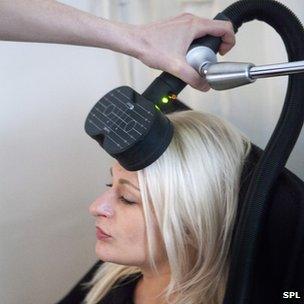Magnetic fields 'help smokers quit'
- Published

Magnetic fields can change the activity of brain cells
Using magnetic fields to alter brain activity may help some people quit smoking, according to an early study.
The researchers said they had used transcranial magnetic stimulation (TMS) to "undo" nicotine addiction in the brain.
The findings, presented at the Neuroscience 2013 conference, external, suggested the technique could help people cut down or quit completely.
Further trials are needed before it could be recommended as a therapy.
TMS stimulates neurons to alter brain function and is already used in some patients with depression.
The team at Ben Gurion University in Israel targeted magnetic fields at two regions of the brain associated with addiction to nicotine - the prefrontal cortex and the insula cortex.
The 115 regular smokers in the study were split into three groups and for 13 days they were given high-frequency TMS, low-frequency TMS or no treatment at all.
Those getting high-frequency TMS had lower levels of smoking and were more likely to have quit at the end of the six-month study.
The highest success came when participants were also shown pictures of a lit cigarette while having the magnetic therapy - a third had quit after six months.
The researchers argue the therapy may be changing the brain's hardwired response to smoking "cues".
'Dent in smoking'
Dr Abraham Zangen, from Ben Gurion University, said: "Our research shows us that we may actually be able to undo some of the changes to the brain caused by chronic smoking.
"We know that many smokers want to quit or smoke less and this could help put a dent in the number one cause of preventable deaths."
Dr Chris Chambers, who specialises in TMS at Cardiff University, told the BBC: "This is a neat, well-controlled study.
"Its main contribution is to add to growing evidence that brain stimulation, when applied to specific parts of the frontal lobe, can boost our ability to overcome addictions.
"This is exciting and has a myriad of applications in psychiatry."
However, he cautioned that the study had not yet been peer-reviewed and that "we need to develop a much clearer understanding of why and how such methods work".
A separate study, reported at the same conference, suggested that stimulating the brain with implanted electrodes may help combat heroin addiction.
Normally, rats given free access to the drug at the press of a lever will keep taking more and more of the drug as they become addicted.
However, those having deep brain stimulation took less of the drug and did not show the escalating drug-use pattern.
Commenting on both studies, Prof Barry Everitt, from the University of Cambridge, said: "Non-drug interventions would be an enormous step forward in drug abuse treatment, which currently relies on replacing one drug with another and has an extremely high rate of relapse."